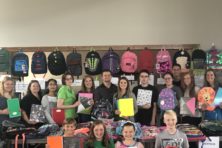Finding Success at School
- Share
- Tweet
- Pin
- Share
Katlyn Gerdmann, a junior at Southern Door, has gone to school in the same building since kindergarten, but three weeks ago everything changed.
That’s when she was admitted to SOAR, the school’s alternative education program, where she and 23 other students get the extra help they need to graduate.
“I have two other siblings and they did not graduate, so it’s like, it’s on me,” Gerdmann said. “I’m the youngest one, and it’s like, well, my parents didn’t have any kids that actually graduated. I’m a kid, I mess up or whatever, but I just want to make them proud. I want to do something with my life and go somewhere, and you need to graduate to do that.”
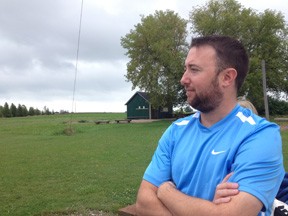
SOAR director Josh Rankin watches students on their field trip to the Team Leadership Center. Photo by Carol Thompson
The SOAR program is all about success – the need for it, the search for it and the celebration after finding it. Young students struggling through classes for social or academic reasons are invited to apply, then guidance counselor Rebecca Frisque and SOAR director Josh Rankin interview them to make sure they’re ready to invest in their education.
Students accepted into the program, which stands for Student Opportunity for an Alternative to Regular education, have to identify goals they’ll work toward during the year. For most, it’s to get enough credits to graduate.
“It becomes about that number of 22 credits,” Rankin said. “Our juniors and seniors, they’ve had the chance, it just hasn’t worked. Usually this is our last stop of intervention to help them to be successful, and it works.”
So far every SOAR student has graduated. Out of the 86 students that graduated from Southern Door last year, 12 were from SOAR.
The graduation rate may contribute to the program’s popularity – three students who live in other school districts attend Southern Door just for SOAR – but the comforting, relaxed atmosphere of the SOAR room contributes, too. School is no longer about getting lost and forgotten by the system, it’s about getting support from teachers who want you to succeed.
That’s why Gerdmann applied in the first place.
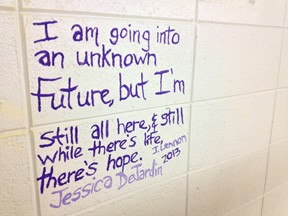
SOAR graduates leave future students with positive messages painted on the classroom walls.
“I’m the type of person not to ask for help if there’s a bunch of people in the room, I just don’t do it,” she said. “But up here it’s easy to get more help.”
The SOAR room is upstairs, away from the rest of the school. The walls are painted with motivational quotes from graduates, and the bookshelf is stocked with classic young adult books such as Hatchet, Catcher in the Rye and The Outsiders. Students come for their study hall periods, to take online classes or to ask Rankin for help when they get a break between regular classes. Rankin teaches some English and Social Studies classes for SOAR students, too.
While all the students in the program benefit from extra help and attention, Rankin said there is no stereotypical SOAR student. Some are just slow readers, others deal with issues such as pregnancy or trouble at home.
“We have kids where home lives are a challenge, they don’t have a lot of support at home,” Rankin said. “So what we try to provide is a place where we constantly talk about community. We’re a family, so how do you, as a family, support one another? How do you lean on people when you need to lean on them and how do you absorb some more weight when you’re strong enough to do that. Like any family it’s not pretty, there are at times conflict, but we really work on open communication, open dialogue, talking through conflict.”
Frisque, who’s known students since before they were in the program, continually sees the difference SOAR makes.
“The kids want to come back [to school],” she said. “When I worked with them prior to them being in SOAR they’re defeated, they don’t think graduation is within reach, and if it’s not going to happen why even try? Then when they get to SOAR they’re like a family, they encourage each other, Josh [Rankin] really pushes them to do the best job they can. You see that attitude from defeat and having something not be possible at all to ‘yeah I might actually be able to do this.’”
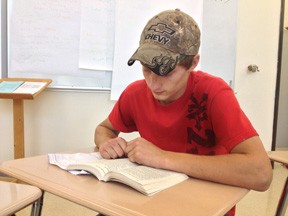
Tyler Tomes reads in the SOAR classroom at Southern Door High School.
SOAR started six years ago when Southern Door Schools received a grant from the Department of Public Instruction to start an alternative education program. Funding for the five-year grant was cut after three years, but the school stepped in.
“At that point we had to make a determination, do we continue with the program or not?” said Southern Door High School principal Steve Bousley. “The school felt very strongly that there was the need, and we were definitely committed to continuing the program. That’s been our position ever since.”
Schools aren’t required to have an extensive alternative education program like SOAR, but Bousley said the cost of the program is more than justified considering the number of students it serves.
“What would the students do without it?” Bousley said. “What would their options and alternatives be? For many students there would be no option, they wouldn’t be going to school.”
While the program works well for the students enrolled, it doesn’t serve Southern Door’s whole need for alternative education. There are 24 students in SOAR this year, and three more applied but were turned down because of resource constraints. Rankin tries to cap the program at 20 students to maintain the level of one-on-one attention students need.
“The need exceeds our ability right at this moment,” Bousley said. “We have more students that need our program than we’re able to serve. It shows we need to continue to work hard to figure out ways to meet those needs.”
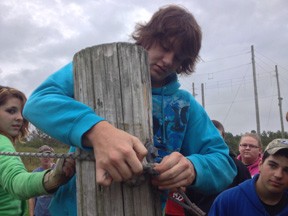
Wyatt Delwiche ties a knot on a low ropes course at the Team Leadership Center, where SOAR students go every year to learn life skills they can apply to the classroom.
Last year’s class of participants from Leadership Door County, a program that brings together community members from around the county, worked with SOAR to create a business plan and logo for the program and develop a program to connect students with local business leaders.
“Students who graduate sometimes don’t have a direction,” said Ann Vandermissen, who worked with Leadership Door County last year. “College may not be an option for them, and to give them a start at a local business was important to us.”
So far just one student is connected with a business, but Vandermissen said the mentorship plan will continue to grow and help more students connect with local businesses so they can learn skills and make connections that will help after high school.
Gerdmann is one student already looking past graduation. She works 20 hours a week, trying to save enough money to move out next year and pay for a class to get her nursing assistant certification. With that certificate she can make more money than she does now working at a restaurant and hotel in Sturgeon Bay.
That certificate and the increased wage that comes with it is in sight because of SOAR.
“They help us more,” Gerdmann said. “My grades were real bad. [In SOAR] they push you to do things, they check our grades all the time to make sure we have our stuff in on time. They just keep on you. If you’re in a regular study hall they don’t keep on you. You can do whatever, and that’s what I did. I did anything and everything but my homework.”

